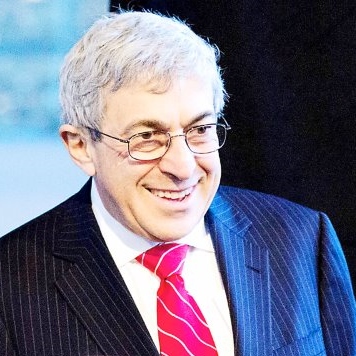
News

International CEO of the Year is South African
TALI FEINBERG
“Being recognised as CEO of the Year, an honour I accepted on behalf of our 21 000 team Schein members around the world, has been one of the most humbling experiences of my life,” said Bergman.
This honour is bestowed upon outstanding corporate leaders who are nominated and selected by peer CEOs.
He won this for his work as Henry Schein Inc CEO and chairman of the board since 1989. This company is the world’s largest provider of healthcare products and services to office-based dental, animal health and medical practitioners. It is represented in 33 countries and employs more than 21 000 people, and has headquarters in Melville, New York. It had a record $11,6 billion in sales in 2016.
Bergman now joins a list of illustrious prior CEOs of the Year, that include the likes of Microsoft’s Bill Gates; former General Electric CEO Jack Welch; Michael Dell, a pioneer of personal computing, AG Lafley of Procter and Gamble John Chambers, Xerox’s Anne Mulcahy, Intel’s Andy Grove and Herb Kelleher of SouthWest Airlines.
“I am filled with gratitude, as this award is certainly not in recognition of individual achievement. Every great success requires a team, and at Henry Schein we have an exceptional team,” he says.
This PE-born leader, was an active member of Habonim and went to Grey Junior and High Schools before studyying at Wits University and Tel Aviv University. He is married to Marion, and they have two sons and four grandchildren. Based in New York, the family have maintained strong ties to South Africa and uphold their Jewish identity.
Speaking to the SA Jewish Report from New York, Bergman says his parents fled Nazi Germany in February 1936 for South Africa, and settled in the community of South End in Port Elizabeth, where his parents’ business was a key part of the fabric of the suburb.
“South End was one of the few remaining racially integrated communities during the waning years of apartheid,” says Bergman. “Growing up in this wonderful and vibrant place, and later witnessing how apartheid destroyed the dynamic harmony of the community, influenced me deeply. Of the many lessons I learned from the South End, one stands out: the richness of diversity and the strength of pluralism.
“These lessons were amplified by the values of Judaism that were so central in my wife’s and my own family when we were growing up. My parents instilled the concept of tikkun olam (healing the world) in me, and Marion’s parents did the same for her. In turn, we have worked hard to instil this value in our children.
“Participating in Habonim from an early age, reinforced these values, while at the same time providing an excellent leadership development platform.
“I always remind our young managers that those who are good at ‘running a summer camp’ make excellent future leaders in business, or, in fact, any walk of life. A great camp counsellor knows how to get the entire team engaged in the mission!”
Bergman says it has been amazing to see how the South African Jewish community has evolved over the years. “It is remarkable to see a new, young, path-breaking generation of leaders who have found a new way for Jews to contribute to the life of a fascinating and complex new South Africa.
“They are taking their place in a political culture that has embraced pluralism and equality as cardinal principles, engaging in an unapologetic give-and-take, as South Africans and as Jews.”
Bergman says the success of the global economy is closely linked to growth and development in the “new Africa”, and the continent’s promise is truly extraordinary.
“Business leaders in South Africa are ideally positioned to be at the forefront of unlocking Africa’s phenomenal potential, while working to create a better world more broadly.
“Creating a better world requires business leaders to fully embrace a responsibility to be engaged in the shaping of society. With all of the incredible advances and opportunities presented by the breath-taking technological advances of what many refer to as the ‘Fourth Industrial Revolution’, there are many in society who are being left behind,” he adds.
“If we disregard the importance of ensuring that all members of society benefit from these advances, we risk ever mounting disenfranchisement and civil dissent, which jeopardises global stability and all democratic societies. Business leaders have an obligation to civil society to do a better job expanding the benefits of emerging technologies to all.
“Creating a better world also requires leaders who embrace diversity. As business leaders, our organisations benefit greatly from the richness of diversity, and we have the opportunity to promote a civil dialogue among people of every political, religious, economic and cultural background.
“This effort to build bridges starts within our own teams, and expands to our larger communities and beyond,” he said.




